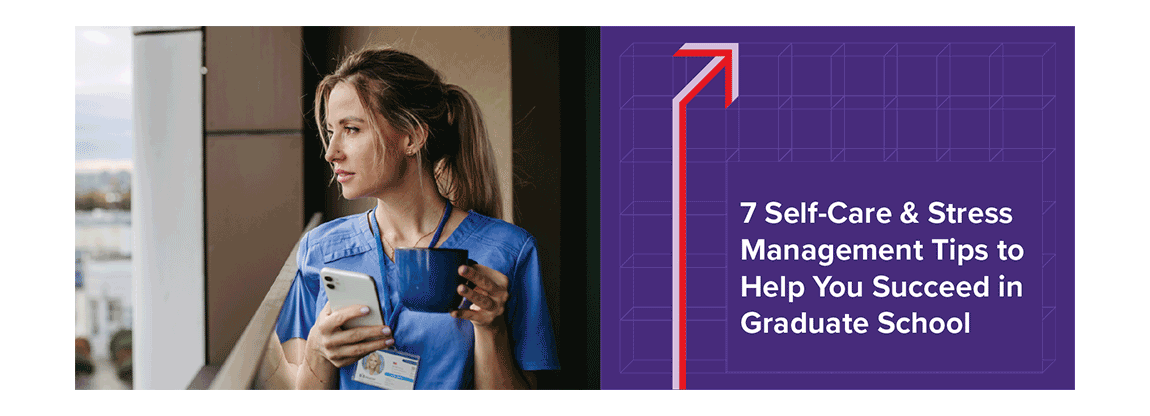7 Practical Self-Care and Stress Management Tips to Help You Succeed in Graduate School
7 Practical Self-Care and Stress Management Tips to Help You Succeed in Graduate School
In a 2021 study of mental health and lifestyle behaviors among health professions education faculty and students, between 5.5% and 9.9% of all participants had a positive depression screen, and 11.5% to 26% had anxiety. Universities are being asked to implement wellness programs in response to the common issues of stress, depression, anxiety, and burnout, but what can you do as an individual to be proactive in decreasing your personal stress? Here are seven practical tips and tools that you can use now to improve your mental and physical wellbeing.
1. Be intentional with your time
Managing a full schedule that includes both work and studies can be overwhelming; however, there are many time management strategies out there. One that improves focus and productivity is the Pomodoro Technique.
- Choose a task to focus on, then set a timer for 25 minutes and get to work until the timer ends. If you have a project or study session that requires more than 25 minutes of uninterrupted concentration, extend your Pomodoro session accordingly, but don’t work any longer than 60 minutes without a break.
- Take a 5-minute break, and repeat.
- After four sessions, take a 20–30-minute break to prevent fatigue and maintain high productivity.
Pro tip: Silence all electronic notifications to decrease distractions and focus on the task at-hand.
2. Get plenty of Zzzzzs
- Aim for 8 hours a night of restful sleep.
- Avoid alcohol or other substances as they prevent you from entering deep REM sleep which is restorative.
- Stay off all screens for at least one hour before bedtime to allow your brain to unwind.
- Consider using white noise to block disruptive sounds. Use pink noise for relaxation and deeper sleep.
- If you can’t fall asleep within 15 minutes, go to another room, and do something relaxing until you become sleepy. This helps prevent your brain from associating your bedroom with stress.
3. Eat your veggies. . . and fruit
A balanced diet fuels your body and brain so you can meet all the mental and physical demands of your daily life. Six servings of fruits and veggies are recommended daily, and a serving size is between 4 and 6 ounces (about 177.44 ml). Try the 1-2-3 approach to meeting these requirements:
- 1 serving with breakfast
- 2 servings with lunch
- 3 servings with dinner
4. Exercise to relieve stress
Forms of exercise which use large muscle groups, such as walking or jogging, help decrease stress. Other exercises such as yoga, tai chi, or qigong, which include a focus on breathing, aid in distraction and lower stress. Aim for 150 minutes (about 2.5 hours) of moderate aerobic activity each week.
5. Use deep breathing techniques when you feel overwhelmed
One popular technique is known as box breathing, or four-square breathing.
- Open your palm and place the index finger from your opposite hand at the bottom corner. Inhale slowly through your nose for 4 seconds while you trace a straight line upwards to the top of your palm.
- Hold your breath for 4 seconds while you trace a straight line across the top of your palm with your index finger.
- Exhale slowly through your mouth for 4 seconds as you trace a straight line down to the bottom of your palm.
- Hold your exhale for 4 seconds as you trace a straight line across the bottom of your palm.
- Repeat steps 1-4 at least 3 times.
6. Develop a strong support system
- Make time to connect with peers who share similar challenges. Talking through your challenges with people who understand can help you troubleshoot and decrease stress.
- Ask for guidance from faculty when you have academic difficulties.
- Find a clinical mentor and ask for help when needed.
- Lean on family and friends for emotional support.
7. Get professional help
The mind-body connection is real. And the effects of stress can manifest as physical symptoms so take care of your mind and body.
- Most universities offer physical and mental health services, including counseling, so take advantage of these cost-effective resources.
- Seek convenient telehealth options to help meet your physical and mental health needs from the comfort of your own home, which will also save time.
- Contact the Substance Abuse and Mental Health Services Administration (SAMHSA) National Helpline in the event of a crisis at 1-800-662-HELP (4357)
About the Author:
Melanie Allison is Director of Education & Learning at McGraw Hill within the Professional division. Melanie is a Doctor of Nursing Practice, an acute care nurse practitioner, and a registered nurse.

